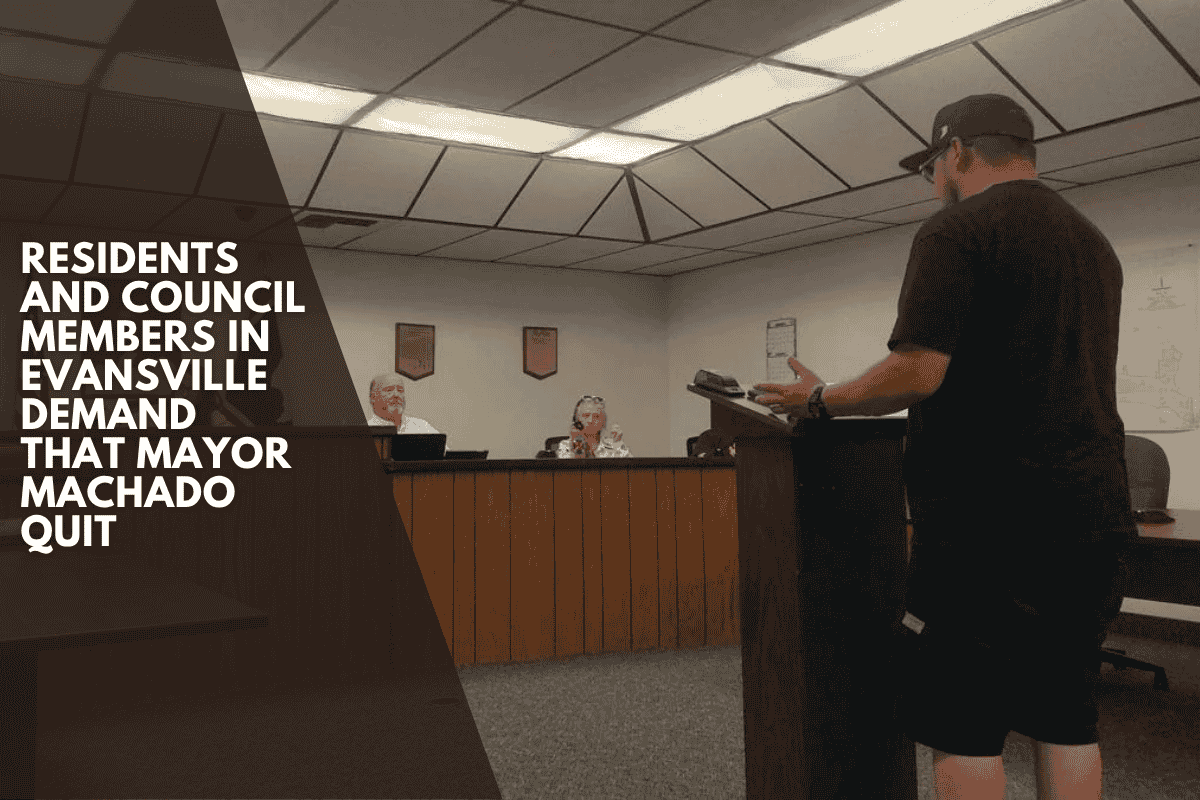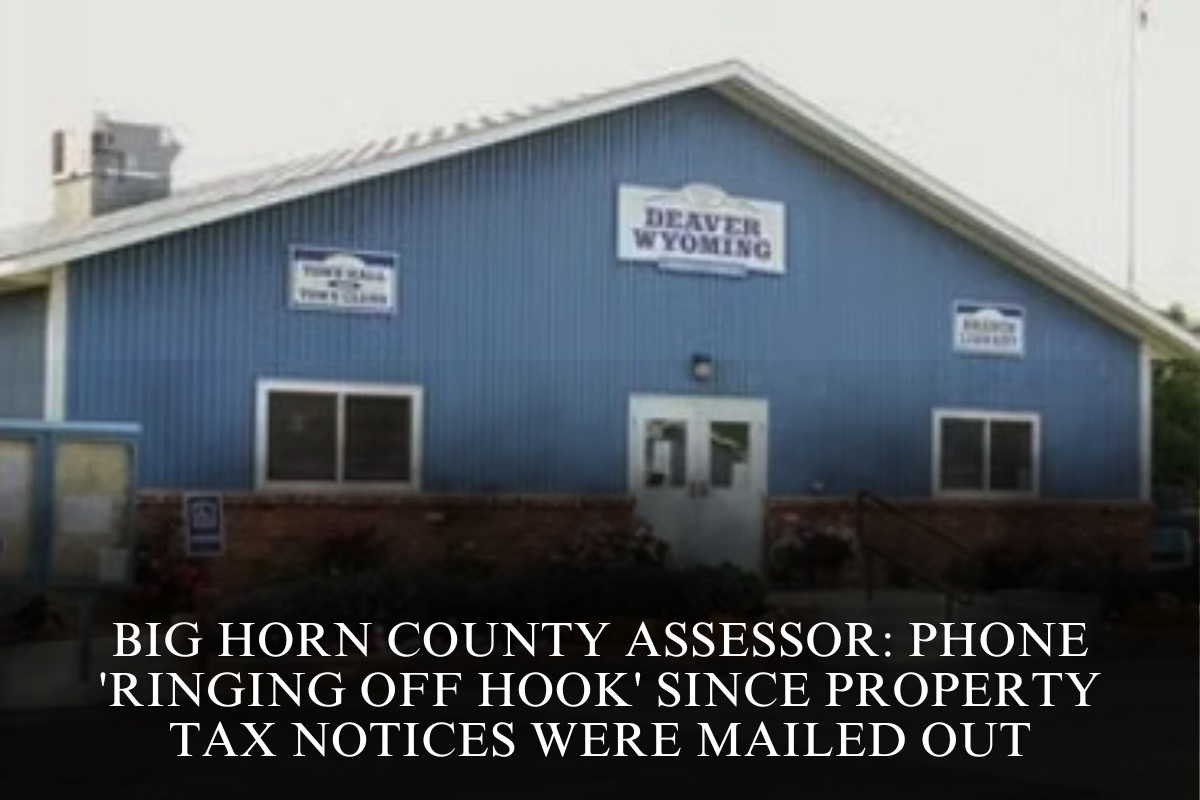EVANSVILLE, Wyo. — Jeremy Brown, the Evansville resident who recently made headlines for planting swastika flags in front of Evansville Town Hall to counter the previously planted Pride flags set up by Mayor Candace Machado, was about to apologize when a short, soft-spoken woman approached him, looked him in the eyes, and told him what had been on her mind for the past two weeks.
“I’m a Jew,” she said, her eyes watering but not breaking contact, “and I was planning to build a house here in Evansville. However, after the placement of swastikas, I am uncomfortable here.
I do not feel welcome. I feel attacked because you decided that comparing a rainbow to a swastika constitutes hatred. “It’s the most disgusting thing I’ve ever seen.”
On Monday, the Town of Evansville conference room was packed to the brim with residents, many of whom used their designated time during the Evansville Town Council Meeting’s public comment section to discuss the current differences of opinion regarding Pride flags, swastikas, proper and improper mayoral behavior, and the concept of free speech.
Jeremy Brown was one of those people. Brown led a group of people calling for Evansville Mayor Candace Machado’s resignation on Monday.
Given three minutes to speak, Brown used his time to argue that Machado is unfit to serve as mayor due to a number of perceived inconsistencies.
However, during his time at the podium, Brown apologized for using the swastika symbol to emphasize that neither a swastika nor a rainbow should be seen on government property.
“I’d like to start of by telling everyone in, around, and out of the community that I am sorry and I apologize if they were offended by my use of the swastika,” he told me. “My sole intention was not to offend anyone, but rather to draw attention to the issues surrounding ideologies displayed on government buildings and the dangers that come with them. It causes division, hatred, and, frankly, we don’t need that in our community.”
Brown singled out Mayor Machado, asking why there was no vote to remove a Nativity scene displayed outside the Evansville municipal building.
Machado previously stated that the display was in poor condition and that the person who donated it had died that year, so the decision was made not to display it in 2024.
Brown also questioned why there was no vote to raise Pride flags.
“Why is the council not working together for the betterment of the town?” the man asked. “What is the point of having a town council if only a few people make decisions for the community? It is completely silent in one direction, and we are sick of it.”
Brown then asked Machado directly if she was going to resign.
“The mayor can either resign or we can remove her,” he told me. “If you want to be the first elected official in Wyoming to be removed from office, we can do so and make history. So, let’s do it. Are you going to resign at this time, yes or no?
“I will not,” Machado replied.
Brown was not alone in his thought process. A handful of people with similar complaints also spoke with Machado and discussed her decision to place Pride flags outside Evansville Town Hall.
Natalie Rollins, another Evansville resident, said she was surprised to see Pride flags in front of Town Hall.
“I have lived in Evansville all my life and I have to say those rainbow flags absolutely disgust me,” commented the woman. “To me, they represent pedophilia. Abortion. Yes, pedophilia.
The books available in schools for our children. Do you all know what that is about? They basically show your grandchildren how to have sex. “Do you guys want that?”
Machado had to call for order due to the audience’s response, which included gasping, applauding, and snickering.
Not only did Evansville residents call for Mayor Machado’s resignation, but so did Councilmember Greg Flesvig. Following the public comment period of the meeting, Flesvig expressed his thoughts on the situation.
“As councilmember and resident of Evansville, I’m addressing the controversy surrounding the mayor’s actions regarding the flag displays at town hall,” he told reporters. “This statement outlines and expresses a disapproval of the mayor’s conduct and accountability.”
Flesvig claimed that Mayor Machado unilaterally and independently placed flags in front of town hall, launching a campaign perceived as “antagonistic to Evansville citizens.”
Flesvig claimed that Machado’s actions knowingly violated state ordinances governing flag displays on town property. These actions were not well received by the public, he said, and they exacerbated the divide between the mayor and Evansville residents.
“I don’t agree with either flag being displayed, but I do criticize the mayor’s ongoing hostility toward its citizens. I believe the public deserves an apology for the mayor’s actions, and I extend one on behalf of the council. “I apologize for the mayor’s actions.”
Flesvig stated that Machado’s decision prompted numerous phone calls, text messages, emails, and social media posts, and that he would like to see potential disciplinary action taken in accordance with the Evansville Town Council’s common rules of ethics.
“On behalf of the citizens of this town and those that spoke, I’m formally presenting a letter of resignation to the mayor,” he informed them. Flesvig then handed the letter to Machado, who took it but did not sign at the time.
Following those remarks, the Evansville Town Council entered executive session before adjourning for the remainder of the evening.
Following the meeting, Brown spoke with the media once more, emphasizing that, despite his decision to plant swastika flags, he does not agree with what the swastika represents.
“I’ve been very clear about this from the get-go,” Brown told the crowd. “I am not a Nazi.” I do not believe in Nazism. I am an American. I am a patriot. I believe in free speech. That’s the whole reason I did it; once you allow one, you have to let them all go.”
As Brown spoke, a woman approached him, tears in her eyes. Despite her quiet, demure demeanor, she looked Brown in the eyes and challenged him with a firm voice on many of his statements.
“I’m a Jew,” she explained. “And I planned to build a house here in Evansville. We just bought a lot. However, after the placement of swastikas, I am uncomfortable here. I do not feel welcome.
I feel attacked because you decided that comparing a rainbow to a swastika constitutes hatred. “It’s the most disgusting thing I’ve ever seen.”
Brown attempted to interject, repeating that he does not believe what the swastika represents, but the woman spoke over him.
“My great-grandmother was in a concentration camp,” she told me. “I lost great-cousins, I lost great-uncles.” Her eyes began to water. Her voice trembled, but she regained control and continued.
“My family was among the few who made it out. And I assumed we were in a free country. I thought I was in a place where I would be welcomed and safe. But you made me realize there is no safety for us.”
Brown, his voice softer, attempted to argue his point once more.
“You’re missing the point,” he replied. “You’re too focused on the symbolism, not the display. You can’t get past your emotions. That was not my intention. “My intention was not to offend.”
The woman, who asked to remain anonymous in this story, stated that the intentions did not matter. It was the actions that counted, and Brown’s actions convinced this woman that she couldn’t possibly build a home in a town that compares swastikas to rainbows.
“My intention was not to offend you,” Brown explained. “It was to grab attention.”
“You didn’t offend me,” the woman said. “You broke my heart.”












